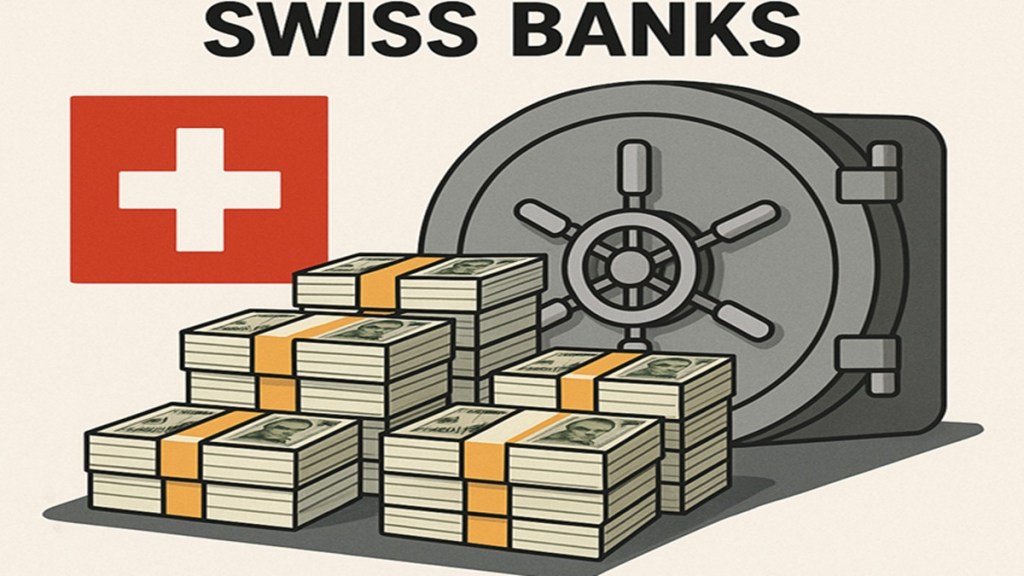The question about Indians’ deposits in Swiss banks was raised in Parliament once again. Has the amount of Indians increased three times to about Rs 37,600 crore in 2024? Does this include black money? And how much black money has been brought back from abroad since 2022?
What did the government say in Parliament?
Responding to these questions, the central government cited media reports that the Swiss National Bank (SNB) statistics indicate that Indians’ deposits in Swiss banks rose in 2024.
“There are some media reports based on Swiss National Bank (SNB) statistics which mention that Indian-linked funds in Swiss banks have risen in 2024 as compared to the previous year’s amount,” Minister of State in the Ministry of Finance Pankaj Chaudhary said this in a written reply to a query asked by one Rajya Sabha member, Javed Ali Khan.
“The media reports also mention that, as per Swiss authorities, the data in respect of SNB statistics includes, inter alia, amounts due in respect of customer deposits (including in foreign branches of Swiss banks located in any country) and other liabilities as well as amounts due to banks, and that the Swiss authorities have clarified that the SNB annual banking statistics should not be used for analysing deposits held by residents of India in Switzerland,” the minister further said.
The government clarified the nature of the SNB data, saying it includes customer deposits, other liabilities, amounts owed to different banks, and deposits in foreign branches. Hence, it is incorrect to assume that the entire amount is “black money” held by Indian citizens in Switzerland.
India is getting information: Under the AEOI system
The minister also informed that since 2018, under the Automatic Exchange of Information (AEOI) framework, Switzerland has provided financial information related to Indian residents to India every year. For the first time, this data was received by India in September 2019, and this process continues every year now.
Apart from this, India also gets information related to foreign income and assets from more than 100 foreign tax jurisdictions. If tax evasion is confirmed in any case, the Income Tax Department takes action like: inquiry, search, assessment, recovery of tax and penalty, and criminal prosecution if needed.
How much black money came back from abroad from 2022 to 2025?
The government said that during the 3-month one-time compliance window in 2015 after the enactment of the Black Money Act (BMA), 2015, 684 disclosures revealed undisclosed foreign assets worth Rs 4,164 crore, on which tax and penalty of Rs 2,476 crore was recovered.
-As of March 31, 2025, 1,021 assessments were completed under the BMA, levying tax and penalty of over Rs 35,105 crore.
-A total of 163 prosecution complaints were filed in these cases.
-Rs 338 crore has already been recovered as tax/penalty/interest.
The government also said that the final determination of tax demand takes place only after all appeals relating to it are disposed of in the High Courts and the Supreme Court.
Black money vs legal deposits: Understand the difference
It is important to understand that money deposited in Swiss banks does not always mean black money. It is not illegal for any person or institution to have an account in Switzerland, provided the money is declared and the required tax has been paid on it.
The government has clearly stated in Parliament that the data published by SNB cannot be considered as direct evidence of illegal deposits of Indian citizens.
Conclusion: The Government’s position is clear, need to avoid speculation
Indians’ money in Swiss banks has been a sensitive and discussed topic. But it is clear from the government’s answer in Parliament that SNB’s data is comprehensive and is not an accurate measure of individual black money.
The government receives information about foreign accounts from 100+ countries including Switzerland every year.
A strong legal framework and information system exist to take action against black money.
Therefore, it is important that we understand on the basis of facts that having money in Swiss banks is not a crime in itself. The real concern is when the wealth is undeclared, earned through tax evasion, or comes from illegal sources – and that is what the government is keeping an eye on.

